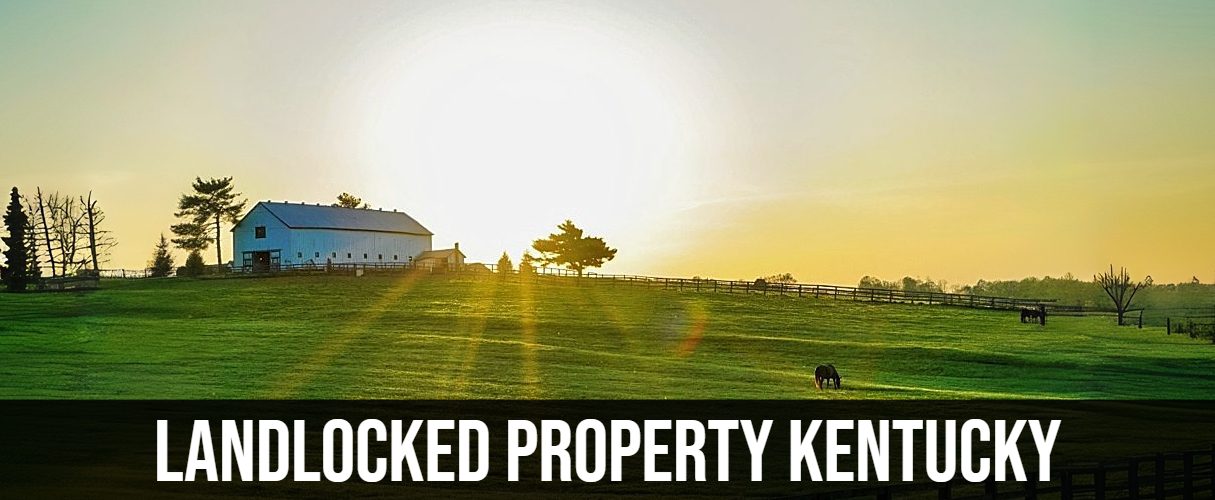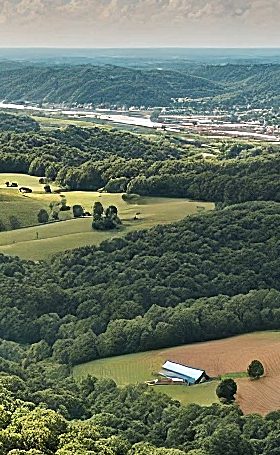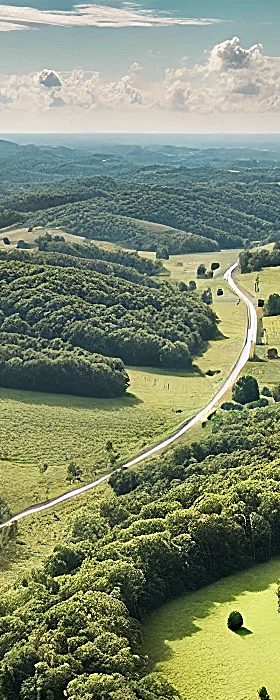
If you’re dreaming of owning a slice of Kentucky, keep an eye out for a quirky little twist in the real estate tale known as “landlocked” property. This is land that finds itself all dressed up with no place to go—no direct access to public roads or highways. It’s like owning a car that can’t leave the garage. Before you commit to buying your own patch of the Bluegrass State, it’s crucial to understand the ins and outs of landlocked property Kentucky, as navigating these can be as tricky as a horse in the Kentucky Derby without a track.
This article gallops through the legal hurdles and fine print that come with landlocked property Kentucky. Whether you’re a first-time land buyer or a seasoned investor, knowing these details is key to avoiding a real estate faux pas. We’ll explore how being cut off from the main road can affect your property dreams and what legal steps you can take to turn a landlocked lemon into lemonade.
Navigating the world of landlocked property Kentucky isn’t just about checking maps; it’s about preparing for a potential legal rodeo. From establishing the right of access to handling disputes with neighbors who might not be thrilled about sharing their driveway, this guide will equip you with the essentials you need to make informed decisions and keep your property aspirations on the right track.

1. Why is Landlocked Bad to Purchase?
Ever thought about buying land in Kentucky only to find out it’s landlocked? It’s like buying a beautiful new car but having no driveway to drive it on. Purchasing landlocked property Kentucky can feel a bit like being a chef in a kitchen where you can’t find the pantry. Without direct access to a public road or highway, developing the land or even just getting to it can range from being a logistical headache to downright impossible. Plus, carving out a path to your new property through easements or rights-of-way isn’t just costly; it’s like haggling over the last piece of fried chicken at a family reunion—potentially messy and always time-consuming.
2. What are the Easement Rights in Kentucky?
In Kentucky, think of an easement as your golden ticket to accessing that elusive landlocked property. These legal lifelines allow you to use someone else’s land for a specific purpose—like getting to and from your own land. You can establish easements several ways: by necessity (when it’s the only way to access your property), implication (when using one piece of land is essential for enjoying another), prescription (if you’ve been using someone’s land openly for 15-20 years without a peep from them), or an express grant (a nice clear written agreement between neighbors).
3. What are Two Major Disadvantages of Being Landlocked?
So, why might buying a landlocked property Kentucky be less appealing? First off, access issues. If you’re always having to negotiate with your neighbors just to check your mail, it might take the sheen off your rural dream home. Plus, the potential for land use is limited as a choice of restaurants in a small town. This can lead to a lower resale value because, let’s face it, not everyone wants to jump through hoops just to reach their front door.
4. How Wide is the Right of Way in Kentucky?
When it comes to buying land in the Bluegrass State, one term you might encounter is “landlocked property Kentucky.” This describes parcels that lack direct access to public roads, making every trip to your property an impromptu puzzle-solving session. If you’re navigating this terrain, understanding the breadth of right-of-way in Kentucky is crucial. Generally, the right-of-way should be broad enough to provide reasonable access to the landlocked property. For newer county roads, Kentucky law mandates a minimum right-of-way width of thirty feet—fifteen feet on either side from the road’s centerline. For the fine print, see Kentucky Statute 178.040.
5. What is Adverse Possession in Kentucky?
Another fascinating aspect when dealing with landlocked property Kentucky is the concept of adverse possession. It’s like the real estate version of “finders, keepers,” where someone can gain legal ownership of your property if they use it openly and without your permission for 15 years. In Kentucky, the squatter must show their use was hostile (not as ominous as it sounds, just without your okay) and visible to all.

6. What is the Problem with Being Landlocked?
Owning landlocked property Kentucky can feel like holding a ticket to a show you can’t access. It can severely limit how you use and develop the land. Without a clear path to and from your land, its value might dip lower than a limbo stick at a beach party. Plus, setting up that essential easement or right-of-way? It can be as costly and lengthy as a bad miniseries, with all the potential for neighborly drama.
7. What is Simple Possession in Kentucky?
So, why might buying a landlocked property Kentucky be less appealing? First off, access issues. If you’re always having to negotiate with your neighbors just to check your mail, it might take the sheen off your rural dream home. Plus, the potential for land use is as limited as a choice of restaurants in a small town. This can lead to a lower resale value because, let’s face it, not everyone wants to jump through hoops just to reach their front door.
8. What are the Trespassing Laws in Kentucky?
Trespassing in Kentucky is straightforward: if you’re somewhere you shouldn’t be without permission, you’re a trespasser. This can lead to either a slap on the wrist or something heftier, depending on whether you’re caught in the act. Landowners, keep those “No Trespassing” signs handy and consider a fence, especially if dealing with a landlocked property in Kentucky.

Case Studies of Landlocked Property in Kentucky
Case Study 1: The Jacksons Find Access Through a Neighbor’s Farm
In Jefferson County, the Jackson family bought 15 acres but quickly hit a roadblock—no access! Their land was surrounded by farms with no road in sight. Mr. Jackson approached their neighbor, Mr. Mullins, who revealed that an old dirt road had been used for years. After a friendly negotiation, they established a prescriptive easement, giving the Jacksons legal access without any hassle. A little neighborly goodwill solved the problem.
Case Study 2: The McCoys Share a Driveway in Warren County
The McCoys purchased a landlocked property in Warren County, tucked behind their neighbor’s plot. Instead of letting it become a headache, they approached Mrs. Harlan, their neighbor. She had been maintaining a long gravel driveway and was happy to share the driveway if the McCoys split the costs. It was a simple agreement that gave the McCoys access and lightened Mrs. Harlan’s load—a win for both families.
Case Study 3: The Adkins Family Wins Easement in Court
The Adkins family faced a tougher challenge in Fayette County when their neighbors refused to grant access to their newly purchased land. With no other choice, they went to court. After months of legal back-and-forth, they were granted an easement by necessity, allowing them to cross the neighbor’s land. While not an easy route, the Adkins family finally gained legal access, proving persistence pays off.
Conclusion to Landlocked Property Kentucky
Purchasing landlocked property in Kentucky can feel a bit like unlocking a mystery—challenging, but not impossible. The key is understanding the legal landscape (pun intended) and knowing your options. Whether it’s establishing an easement, negotiating with neighbors, or getting the courts involved, access issues can be resolved with the right approach and a bit of patience.
It’s crucial to be aware of the responsibilities that come with landlocked property, from ensuring access through a right-of-way to maintaining any shared driveways or easements. These aren’t just legal details—they’re what will determine how much you can truly enjoy and make use of your land. And let’s face it, no one wants to own a piece of paradise they can’t actually get to!
To make sure you’re covered, consulting with an experienced real estate attorney is always a smart move. They’ll help you understand your rights as a landowner and guide you through the process of securing access. Whether you’re planning to build, sell, or simply enjoy your landlocked property, it’s essential to have expert advice on your side.
If you’re considering selling your landlocked property in Kentucky, give us a call! We’ve got the experience to help navigate these tricky situations and ensure a smooth process. Plus, if your land happens to be across the border in Tennessee, Ohio, or any other neighboring state, we can assist there too. We’re not just about finding solutions—we’re about helping you find the right path forward.
Frequently Asked Questions (FAQs)

1. What Is a Landlocked Property in Kentucky?
A landlocked property is a piece of land that has no direct access to a public road. Owners must rely on easements or agreements with neighbors to access the property.
2. How Can I Gain Access to a Landlocked Property in Kentucky?
You can gain access through an easement. This can be done by negotiating with neighbors for a right-of-way, or you may need to pursue legal action to establish an easement by necessity if no access exists.
3. What Is a Prescriptive Easement in Kentucky?
A prescriptive easement occurs when a landowner gains access rights after using a neighbor’s land openly, continuously, and without permission for a period of 15 years.
4. Who Is Responsible for Maintaining an Easement in Kentucky?
Typically, the owner of the landlocked property is responsible for maintaining the easement, including repairs and upkeep of the access road, unless otherwise agreed upon in the easement agreement.
5. Is It Worth Buying a Landlocked Property in Kentucky?
Buying a landlocked property can be a good investment, especially if the price is low. However, access issues can impact development potential and resale value, so it’s important to ensure an easement is secured before purchase.